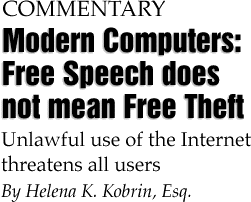


 he potential of the Internet to link individuals from all corners of the world and unify diverse cultures and nationalities makes it a priceless resource for improving understanding between peoples.
he potential of the Internet to link individuals from all corners of the world and unify diverse cultures and nationalities makes it a priceless resource for improving understanding between peoples.
But the freedom provided by the Internet is also open to abuse, and unless the laws are applied on the Internet as well as off it, we will not have global freedom of expression but rather cyber-terrorism. Over-regulation will also ensue if a few dishonest individuals are allowed to flout the law.
Calling for application of the laws and exercise of self-restraint is a substantial contribution to preservation of the right to free expression.
But free speech does not mean free theft, and recently, federal authorities have cracked down on crimes in cyberspace. Criminals on the information superhighway have made it necessary to have traffic rules. If the net users and the access providers do not see that the rules are followed, the courts will be forced into the role of highway patrol.
Censorship is not the real issue, but a smoke screen raised by lawbreakers to divert attention from their own wrongdoing. Laws protecting copyrights and trademarks — and those providing redress for defamation and false accusations that threaten their livelihood or reputation — apply in full to the citizens of the computer world.
It is vital that all users demand responsibility along with the freedoms the Internet brings.

